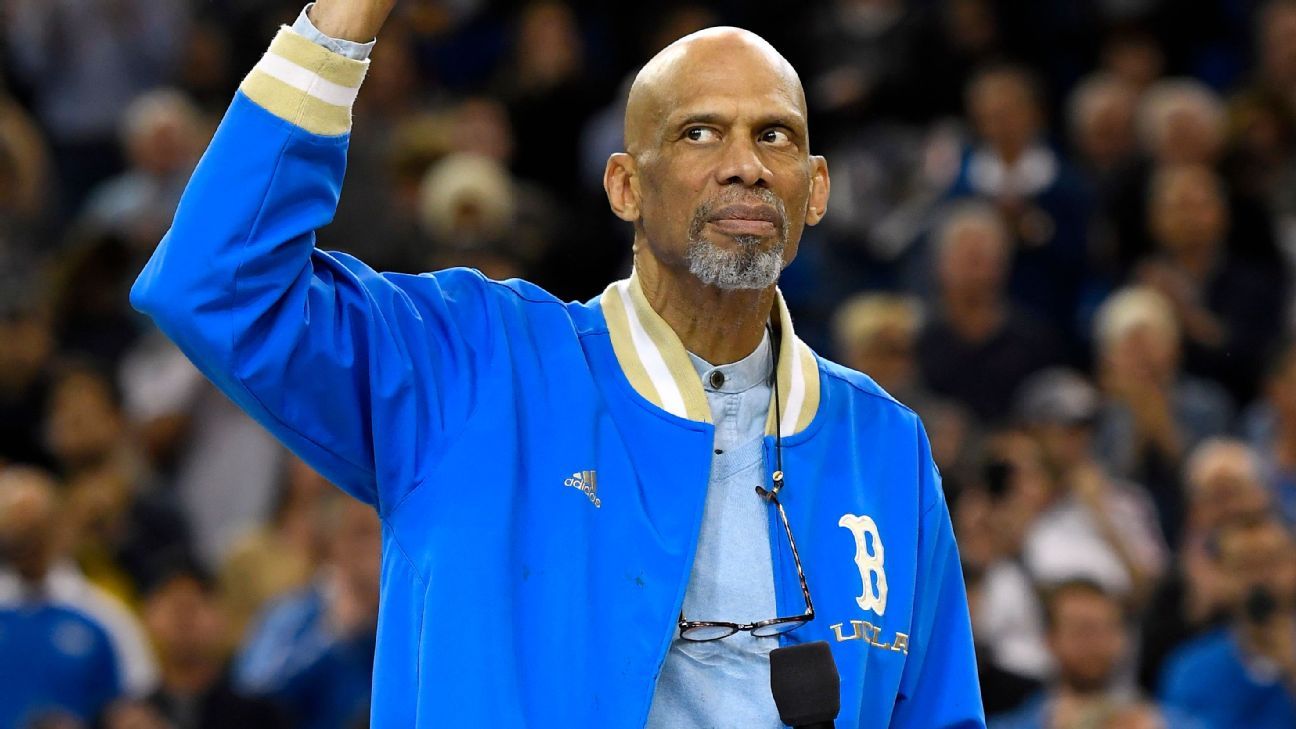The NBA has created a new award in honor of Kareem Abdul-Jabbar, the league’s all-time leading scorer and a noted civil rights activist, that will recognize a player who best embodies his strive for social justice and racial equality, the league announced Thursday.
The winner of the inaugural Kareem Abdul-Jabbar Social Justice Champion award will be announced during the playoffs and will receive $100,000 from the league to donate to an organization of his choosing. Four additional finalists will receive $25,000.
“It’s nice to see the NBA try to promote social justice awareness, and I am very flattered they would see fit to name the award after me,” Abdul-Jabbar, 74, told The Undefeated. “I know I have some history with this, so I’m happy the way it’s worked out.”
All 30 NBA teams will nominate a player for the award, and finalists will be selected by a seven-person committee composed of league executives, activists, and former NBA players.
Aside from being one of the sport’s greatest contributors, Abdul-Jabbar is also a man of conviction, who in the face of Jim Crow-era segregation and racial discrimination, took principled stands for the betterment and progress of African-Americans.
Growing up in the Dyckman housing projects in New York City, Abdul-Jabbar was exposed to the governmental neglect of, and targeted injustices toward, poor, Black people. Incidents such as the murder of Emmett Till in 1955, when Abdul-Jabbar was just eight years old, and the Harlem riots of 1964, sparked by the fatal shooting of James Powell, a 15-year-old Black boy, by a New York police officer, are what triggered Abdul-Jabbar’s ascent into racial politics.
“Right then and there I knew who I was and who I had to be,” he told Sports Illustrated in 1980. “I was going to be Black rage personified, Black power in the flesh.”
Abdul-Jabbar won three consecutive NCAA championships (1967 to 1969) while at UCLA. In between them, he, alongside famed sociologist Harry Edwards, helped organize a boycott of the 1968 Olympics in Mexico City due to the then-recent assassinations of civil rights leaders Malcolm X and Martin Luther King Jr., and the continued mistreatment of Black people in America.
“It was too difficult for me to get enthusiastic about representing a country that refused to represent me or others of my color,” Abdul-Jabbar wrote in his 2017 book, “Coach Wooden and Me: Our 50-Year Friendship On and Off the Court.”
While in the NBA, Abdul-Jabbar and other famous Black male athletes, including Jim Brown and Bill Russell, organized the “Cleveland Summit” in support of world champion boxer Muhammad Ali’s decision to refuse entry into the U.S. Army during the Vietnam War.
Today, Abdul-Jabbar sees many similarities in how athletes — such as Colin Kaepernick, LeBron James, and Maya Moore — have taken a measured approach to racial equality work much like he and others did during the Civil Rights movement.
“I’m glad that they’re taking their time and not rushing into it. If you go into trying to affect change with a chip on your shoulder, and a lot of anger, it really turns off the people that you’re trying to talk to,” said Abdul-Jabbar, who grew up on the teachings of adopted Harlem son Malcolm X before a chance encounter with King while in high school led him to a peaceful, direct action.
“And I am glad they’ve learned that lesson and have made a commitment to do it sensibly in a nonviolent and constructive way. That’s how we get change done. That’s how we managed to overcome the communication gaps and breakthrough.”
Abdul-Jabbar said he hopes this award inspires young, up-and-coming basketball players to continue the work he and other athletes started some half-century ago amid heavy criticism and even death threats.
“They can’t be afraid. That’s the one thing that they can’t do, because if you’re going to give into fear, then we won’t achieve anything,” he said. “We have to have the courage to speak truth to power, and if we can do that, then get the others to feel that way, we can affect change.”
Abdul-Jabbar played in the NBA for 20 seasons with the Milwaukee Bucks and Lakers, winning six championships (five with Los Angeles). Aside from points, Abdul-Jabbar is also the all-time leader in All-Star Game appearances (19) and MVP awards (six).
Outside of sports, Abdul-Jabbar has authored 14 books, starred in multiple films, most notably the 1980’s hit “Airplane!” and was awarded the Presidential Medal of Freedom by then-President Obama in 2016.
